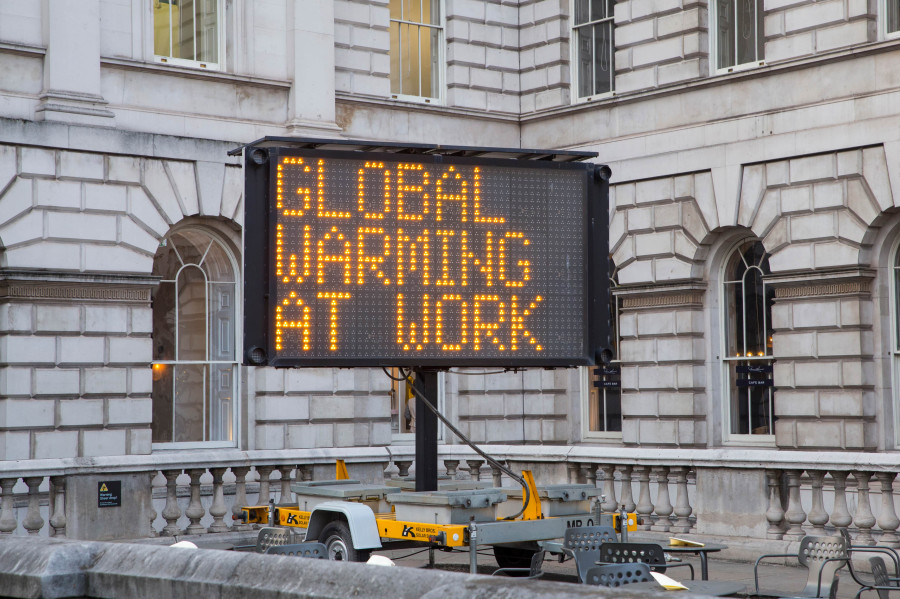Editorial
Climate emergency
The rich countries cannot not assist poorer countries that face the brunt of the climate crisis.
Sixty-one people were killed in the first month of the monsoon this year. According to the National Disaster Risk Reduction and Management Authority, of the total deaths, 28 were due to floods, 26 due to landslides, and the remaining seven due to heavy rainfall. Top officials say this is just a trailer of what increasingly unpredictable precipitation events could bring, with three more months of the monsoon season remaining. But rain-related disasters like landslides and floods are not the only issues at hand, and neither are these incidents exclusive to certain districts and regions in Nepal. One mega-disaster after another, extreme weather events are wreaking "never seen anything like it" havoc across the world. From extreme heat to harsh winters, wildfires and droughts, flash floods and cyclones, the intensity and frequency of these disasters on a warming planet are evidence that all this is not a blip as some would profess. It’s a trend instead with huge consequences on our lives and livelihoods.
The last few weeks are a testimony to what extreme weather events across the world can do. Ravaged by floods, storms, heat waves, wildfires and prolonged droughts, the devastation caused by the disasters has played out in front of our eyes with growing evidence that the climate crisis is a direct result of human actions that emit greenhouse gases into the atmosphere. The unprecedented events at home and globally indicate that we are losing valuable time to address the biggest threat to humanity—climate emergency. Scientists and environmental activists have been repeatedly warning for decades that it will be beyond devastating if we don’t act prudently and swiftly to reduce greenhouse gas emissions. There is no dearth of scientific literature on the subject as to what the world should do before we reach the "point of no return" with unimaginable consequences of rising temperatures. But for lack of political will to honour national and international commitments, the warning on the wall that increased carbon emissions will trigger massive disruptions is coming true with resounding accuracy.
What worries scientists now is that these "lifetime climate events" are happening sooner than estimated and with increased intensity across the world, affecting millions of people globally. Extreme weather events are likely to be more frequent and severe, the World Meteorological Organisation warned earlier this month as extreme precipitation in Western Europe triggered massive flooding killing 188 people, and temperatures soared to 50 degrees Celsius in cold regions of Canada, killing an estimated 500 people. Unusually high temperatures elsewhere have also been linked to devastating wildfires, the likes of which we see in the United States and Australia. Many countries in the northern hemisphere are also reporting warm and scorching weather followed by extreme weather wildfires. Similarly, millions face hunger and displacement in Africa as prolonged drought ravages the continent, while Asian countries continue to be deluged by massive floods and landslides triggered by cloudbursts.
The world is unprepared for what is yet to come, but what is clear from evolving knowledge is that we need collective action to limit warming to within 1.5 degrees committed by governments in the Paris Agreement. To do so, the world needs a global policy that will ensure a drastic reduction in greenhouse gas emissions, and an accelerated transition to a sustainable, zero-carbon economy which established science not only shows is possible but is the only way out. It goes without saying that the biggest emitters responsible for these weather extremes have a moral and economic obligation to shoulder the biggest responsibility as governments come together to review the sixth Intergovernmental Panel on Climate Change report next month. While each country is responsible for adopting policies surrounding the environment and emissions, the rich countries cannot continue to make pledges and back off when assisting poorer countries that face the brunt of the climate crisis.
As one of the most vulnerable countries to the climate crisis, Nepal must get serious about rising temperatures and weather extremes. The government must ensure that our concerns are heard loud and clear at international climate summits while pressing for financial assistance and technology transfer from top emitters. At the same time, we must build both political and public will to do more than just introduce environmental policies on paper while ignoring them when it comes to implementing them.




 9.17°C Kathmandu
9.17°C Kathmandu














